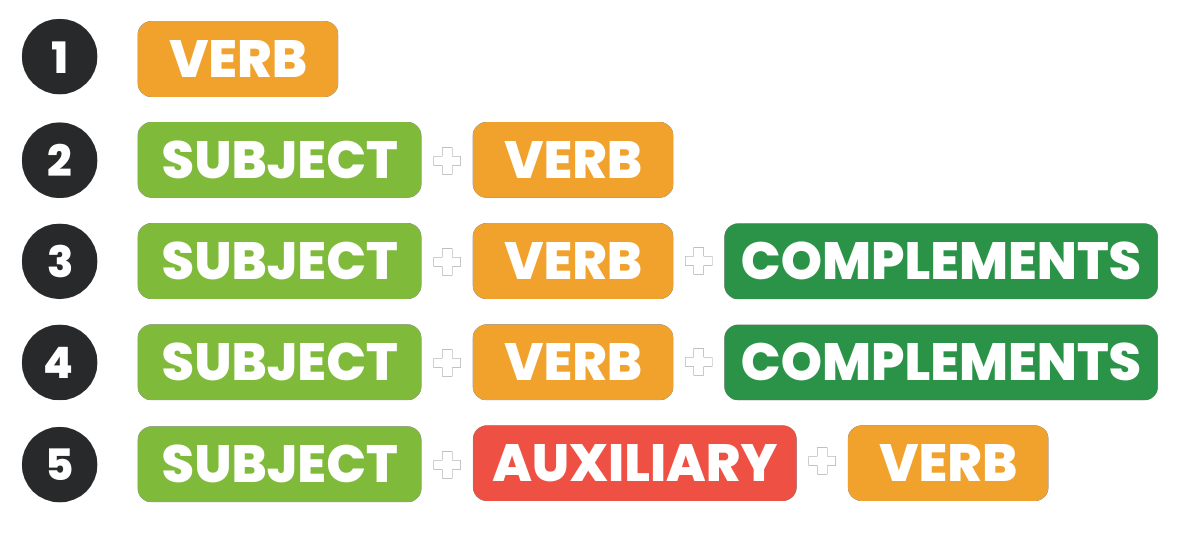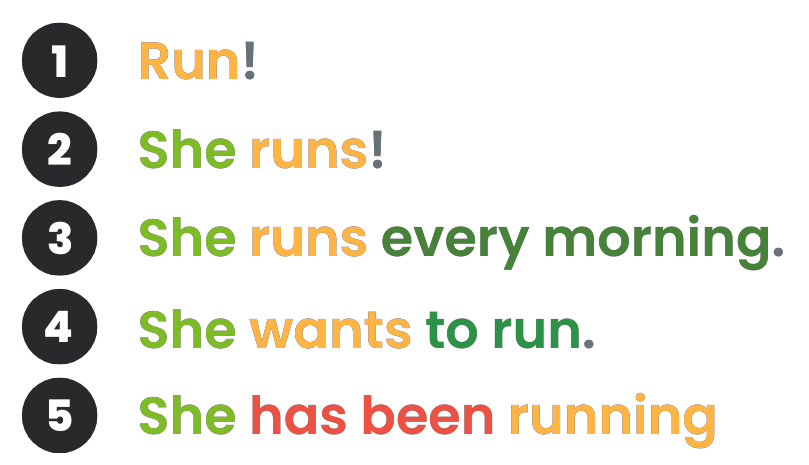I – Sentences, the basics
It is very easy to construct sentences in English, it’s the same pattern in French: subject + verb + complements. The verb usually describes an action or a state.


All of the sentences above are correct. See that you always need a verb.
⚠️ Sometimes complements are necessary. For example, if your remove the complement in sentence number 4 you have: “she wants”. Unfortunately, you cannot have a sentence like this because it needs a complement: what does she want?
II – Questions
A – Two different types
YES / NO QUESTIONS
Yes/no questions can be answered with yes, no or any other adverbs or verbs expressing opinions: absolutely, definitely…

OPEN QUESTIONS
Open questions can only be answered with developed sentences.

* WH- words are: who, what, where, when, why, how (long, many…), which & whose
B – Choosing the correct auxiliary
An auxiliary is a a word that adds functional or grammatical meaning to a sentence. It is used to create questions and negative sentences. Auxilaries are be, do and have. Modal verbs also work as auxiliaries such as: can, could, may, might, must, should & would
1. THERE IS NO AUXILIARY ALREADY: ADD DO
⚠️When you add an auxiliary it will changed according to the tense. If the auxiliary is conjugated, the main verb is not conjugated anymore.
(Examples: I worked yesterday → Did you work yesterday? / She always works on Sundays → Does she always work on Sundays?)
YES / NO QUESTIONS
Yes, I want pancakes → Do you want pancakes?
Yes, I leave school at 5pm → Do you leave school at 5pm?
No, she lives in Lyon → Does she live in Paris?
OPEN QUESTIONS
I want … for dessert → What do you want for dessert?
I leave school at … → When do you leave school?
He lives in / at … → Where does he live?
⚠️ Sometimes “do” / “have” are used as a verb and not an auxiliary, it means “faire” / “avoir”. In that case you still have to add the auxiliary
(Examples: I do my homework every day → Do you do your homework every day? / I have a cat at home → Do you have a cat at home?)
2. THERE IS ALREADY AN AUXILIARY: CHANGE ITS PLACE
Yes, I have stopped working → Have you stopped working?
Yes, she can run for an hour → Can she run for an hour?
Yes, she will repair the roof → Will she repair the roof?
She has started making … → What has she started making?
He can cook something → What can he cook?
They will make a snowman → What will they make?
3. THERE IS THE VERB BE: CHANGE ITS PLACE
No, he is 16 years old → Is he 15 years old?
Yes, he is working on Mondays → Is he working on Mondays?
He is 15 years old → How old is he?
He is working on Mondays → When is he working?
⚠️ “Have” and “do” can sometimes be verbs and not auxiliaries, in that case you have to add “do” as an auxiliary.
However, for “be” even if it is a verb and not an auxiliary you have to change the place of the verb or the auxiliary
4. THE WH- WORD IS THE SUBJECT OF THE SENTENCE: NO AUXILIARY
If the WH- word is the subject of the sentence, then you do not have to add an auxiliary. To check if the WH- word is the subject ou can change the WH- word by another subject (someone, something, etc.)
Who came to the party → Someone came to the party
What happened yesterday → Something happened yesterday
How many stopped listening → Three stopped listening
